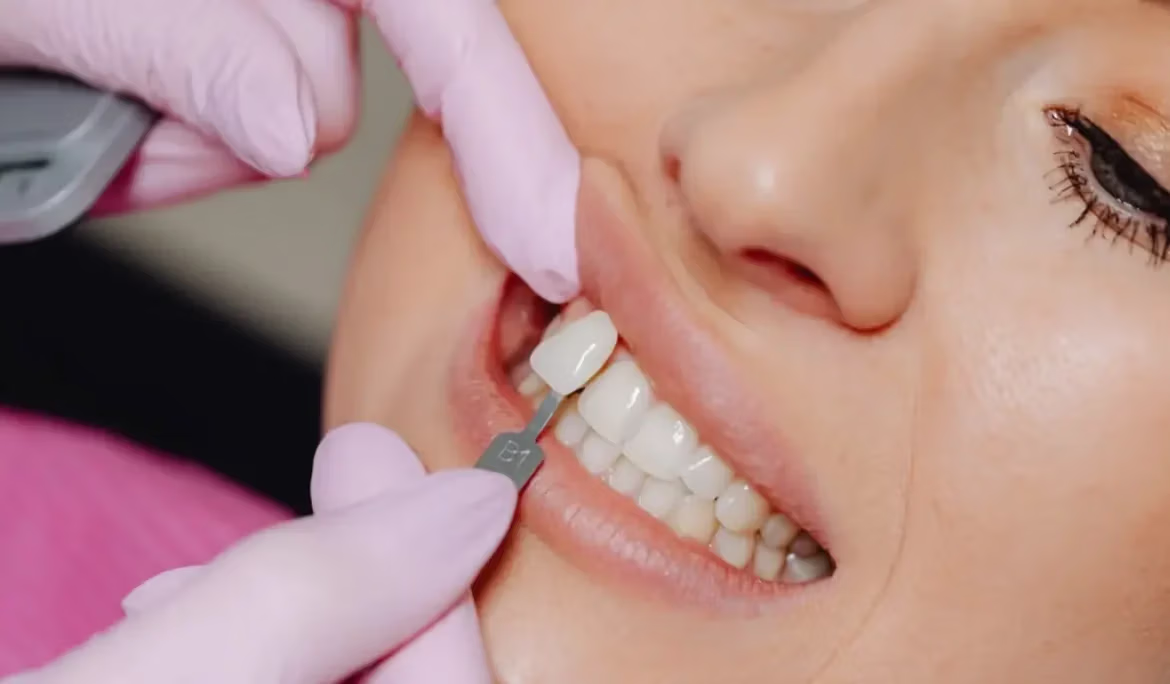Everyone wants a bright, beautiful smile, and they can show off with confidence. But for many people, imperfect teeth hold them back from smiling freely. Veneers offer a fast, minimally invasive way to transform your smile by covering flaws and creating a perfectly even, dazzling white smile.
In this article, we’ll explore everything you need to know about how veneers work and whether they may be right for you.
What Are Dental Veneers?
Dental veneers are thin shells made of porcelain or composite resin that are custom-made to cover the front surface of teeth. They are bonded directly onto the front of existing teeth to transform their color, shape, size, or length.
Veneers are unique to each patient and are fabricated to match the size, shape, and color of your natural teeth. They are used to conceal cracks, chips, gaps, stains, or other imperfections. Veneers provide an alternative to braces, dental bonding, or caps to improve the appearance of your smile.
The thin veneers are bonded to the front of the teeth with a dental adhesive to create a smooth, white smile by covering stains or closing gaps. They can lengthen teeth that are too short, or change the overall shape and symmetry. Veneers offer a fast, minimally invasive way to correct many imperfections without extensive reshaping or dental surgery.
Benefits of Veneers
Veneers offer many benefits that make them a popular choice for improving smiles:
Veneers can whiten, brighten, and straighten your smile. The thin porcelain covers are custom-made to match your natural teeth but can be shades whiter to give you a bright, beaming smile. Veneers can also hide gaps, cover chips or cracks, and correct minor crookedness or misalignment issues. This cosmetic improvement can dramatically boost your confidence.
Veneers help strengthen your teeth and prevent further damage. The porcelain covers protect your teeth’s enamel from chips and cracks. By correcting existing flaws, veneers also prevent decay or other issues from worsening.
With proper oral care, veneers can last 7-15 years or longer. The durable porcelain is stain- and chip-resistant. Following your dentist’s recommendations for cleaning and avoiding biting hard foods will help veneers remain intact and beautiful.
Veneers are stain-resistant, unlike natural tooth enamel. Their porcelain construction prevents stains from coffee, wine, tobacco, and other products from adhering to their smooth surface.
Custom-fit veneers look and feel natural in your mouth. They are thin, lightweight, and strong. You should not feel any difference from your natural teeth after the short adjustment period.
The Veneers Procedure
Getting veneers is a multi-step process that is minimally invasive and requires little pain or anesthesia. It starts with a diagnostic appointment where the dentist will evaluate your teeth’s structure and condition to determine if you are a good candidate. They will take x-rays, and impressions of your teeth, and may recommend mild tooth preparation like filing or contouring to allow for the veneers to be placed properly.
Next, a dental technician will use the impressions to fabricate custom-made porcelain veneers for you. At the bonding appointment, the dentist will carefully roughen and clean your teeth to prepare them for bonding. They will trial the veneers to ensure proper fit and color match before using a special cement to permanently bond them onto your natural teeth. Adjustments may be made to ensure your bite aligns correctly.
It typically takes 1-2 weeks after the initial bonding appointment to come back and make sure the veneers are fitting comfortably and your bite is properly aligned. Minor adjustments can be made at this time if needed. Overall the process requires little pain or anesthesia since it does not involve surgery or drilling down into the nerves of your teeth.
With just a few appointments, veneers can transform your smile with a brand new, perfectly even, and bright set of teeth custom-designed just for you.
How Long Do Veneers Last?
With proper oral hygiene and care, dental veneers can last 7-15 years or even longer. The porcelain material used for veneers is very durable and stain-resistant. According to Aspen Dental, “Dental veneers can last between 5-15 years depending on the materials you choose (porcelain or composite) and how you care for them.”
The longevity of veneers depends on a few key factors. Porcelain veneers tend to last longer than composite resin veneers. Porcelain is incredibly durable and stain-resistant. With good oral hygiene habits like regular brushing, flossing, and professional cleanings, porcelain veneers on the front teeth can last 10-30 years. Composite resin veneers typically last 5-10 years.
Proper care also involves avoiding biting or chewing on hard foods that could crack or damage the veneers. With proper maintenance and avoiding damage, veneers can last for many years before needing any type of repair or replacement.
Cost of Veneers
The cost of dental veneers can vary significantly depending on the materials used and the dentist performing the procedure. According to GoodRx, porcelain veneers typically range from $900 to $2,500 per tooth. The average cost falls around $1,500 per veneer.
Several factors affect the total price of veneers, including:
- Dentist’s location and experience level
- Lab fees for custom fabrication
- Porcelain versus composite resin materials
- Number of veneers needed
In general, veneers done in major metropolitan areas by highly skilled cosmetic dentists often cost more. Composite veneers are a more budget-friendly alternative, with prices starting around $250 per tooth.
Compared to other smile makeover options like dental implants or orthodontics, veneers are relatively affordable. They allow people to transform their smile without the prolonged treatment time and higher costs of braces or surgery. With proper oral hygiene, veneers can last over a decade, making them a wise investment for many patients.
Risks and Downsides
While veneers can greatly improve your smile, there are some risks and downsides to consider:
Veneers require some permanent alteration of the tooth structure. The dentist needs to remove a thin layer from the front of the tooth to allow space for the veneer to be bonded on top. This step cannot be reversed.
Some patients experience pain or sensitivity after getting veneers, especially to hot and cold foods. This usually resolves within a few weeks as you adjust.
While durable, veneers can chip or dislodge if subjected to heavy force. People with bruxism or teeth grinding problems may be at higher risk of damage.
Improperly fitted veneers can lead to gum recession or other oral health issues. It’s critical to have an experienced cosmetic dentist do the procedure.
Like your natural teeth, veneers require ongoing dental visits for examination and cleaning to prevent decay and other problems.
Choosing the Right Dentist
Choosing the right dentist is crucial for getting beautiful, natural-looking veneers that enhance your smile. Here are some tips on finding an experienced cosmetic dentist for veneers:
Look for a dentist who has extensive experience specifically with veneers. Ask about the number of veneer procedures they have performed and how long they have offered them. An experienced dentist will understand how to properly prep the teeth and create custom veneers for the best fit and appearance. As one source notes, “Many reputable dentists will list their continuing education courses on their websites and in their offices. Ask your dentist if they have taken these courses.”
Review before and after photos of the dentist’s veneer work. Reputable dentists will have a portfolio to showcase the transformation they can achieve with veneers. Assessing these photos can help give you an idea of their aesthetic style and ability to create natural-looking results.
Schedule consultations to discuss your cosmetic goals. A skilled dentist will listen to your desired results, examine your teeth, and explain what options like veneers can realistically achieve. They should make you feel heard and provide clear recommendations tailored to you.
Ensure proper diagnostic procedures are followed before veneers are placed. Your dentist should do x-rays, impressions, and evaluation of your oral health to determine if you are a candidate. As one source advises, “Talk to your dentist about your specific cosmetic goals and find out if veneers are the right treatment.”
Your comfort level with the dentist’s bedside manner is also important. Look for excellent communication skills and a dentist who explains things clearly. You’ll work closely together, so choose a trustworthy dentist.
Are Veneers Right for You?
Veneers can transform smiles, but they aren’t right for everyone. The best veneer candidates have healthy teeth and gums but cosmetic flaws they want to fix.
According to Jacas Family Dental, you may be a good veneer candidate if you have minor stained, chipped, or uneven teeth but no serious dental issues. Problems like small gaps or slightly crooked teeth can be corrected with veneers.
However, veneers require a commitment to good oral hygiene. You’ll need to brush and floss diligently to prevent decay and keep veneers intact for years. Regular dental cleanings and checkups are a must as well.
It’s also important to have realistic expectations about the results. Veneers can improve smile aesthetics but cannot change the shape of your teeth or fix all bite issues. Discuss your goals thoroughly with your dentist.
Finally, veneers involve an investment. According to Bunker Hill Dentistry, costs typically range from $900-$2500 per tooth. Evaluate whether veneers fit your budget and if you’re ready to commit to permanently altering your teeth to achieve your ideal smile.
Conclusion
When chosen carefully and cared for properly, veneers offer a fast way to transform your smile. The thin porcelain covers can mask imperfections, create a perfectly even and bright white smile, and give you the confidence to smile freely. But it’s important to have realistic expectations and find an experienced cosmetic dentist you trust to determine if you’re a good candidate.
Meet with potential dentists to examine your teeth and discuss whether veneers are the right option to achieve the smile you want. Ask to see examples of veneers they’ve done for other patients. An ethical, skilled dentist will be honest if they don’t think you’ll get the desired results or if alternatives like whitening or braces may be better.
While not inexpensive, investing in that perfect smile can pay dividends in terms of self-confidence and quality of life. For many, going through the veneer process boosts self-esteem and willingness to smile naturally for photos, social occasions, and everyday interactions. With the right dentist and proper care, veneers can transform your smile and allow you to make the memorable first impressions you’ve always dreamed of.











![Dental Cleaning Dubai: Expert Guide to Costs & What to Expect [2025]](https://blackdiamonddc.ae/wp-content/uploads/2025/07/dental-cleaning-dubai-expert-guide-to-costs-what-to-expect-150x150.webp)

